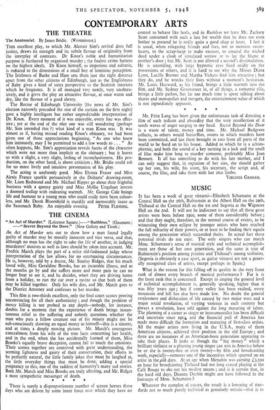THE CINEMA
"An Act of Murder." (Leicester Square.)—" Ruthless." (Gaumont.) —" Secret Beyond the Door." (New Gallery and Tivoli.)
An Act of Murder sets out to show how a man found legally guilty of murder may be morally innocent and vice versa, and that, although no man has the right to take the life of another, in judging murderers' motives as well as laws should be taken into account. Mr. Fredric March plays the part of a strict old-fashioned judge whose interpretation of the law allows for no extenuating circumstances. He is, however, told by a doctor, Mr. Stanley Ridges, that his much loved wife, Miss Geraldine Brooks, has an incurable illness, and as the months go by and she suffers more and more pain he can no longer bear to see it, and he decides, when they are driving home from a holiday, to run the car over a ravine so that both of them may be killed together. Only his wife dies, and Mr. March goes to the District Attorney and confesses to her murder.
This film is two-thirds excellent, only the final court scenes proving Unconvincing for all their authenticity ; and though the problem of mercy killing is not probed to any depth—nobody, for instance, doubts for a moment that the experience of death brings instan- taneous relief to the suffering and nobody questions whether the man who puts a fellow creature out of his misery might not be sub-consciously showing an equal mercy to himself—this is a sincere, and at times a deeply moving picture. Mr. March's courageous concealment from his wife of the true facts concerning her health, and in the end, when she has accidentally learned of them, Miss Brooks's equally brave deception, cannot fail to touch the emotions. Their scenes together are contrived with great understanding, the seeming lightness and gaiety of their conversation, their efforts to be perfectly natural, the little family jokes that must be laughed at, the little everyday things that must be done,' adding a special poignancy to this, one of the saddest of humanity's many sad stories. Both Mr. March and Miss Brooks are truly affecting, and Mr. Ridges a most sympathetic messenger of death. * * * There is surely a disproportionate number of screen heroes these days who are driven by some inner force over which they have no
control to behave like heels, and in Ruthless we have Mr. Zachary Scott consumed with such a lust for wealth that he does not even bother to pretend he is really quite a good chap at heart. I feel it is usual, when relegating friends and foes, not to mention sweet- hearts, to the scrap-heap to make excuses, to conceal the wicked deed under a cloak of simulated sorrow or to lay the blame at another's door ; but Mr. Scott is not allowed a second's dissimulation. He is unsmiling, with large hypnotic eyes fixed avidly on the possessions of others, and it is hard to see why the Misses Diana Lynn, Lucille Bremer and Martha Vickers find him attractive ; but they do, and he wrecks their lives without a moment's hesitation. Mr. Louis Hayward, as his friend, brings a little warmth into the film, and Mr. Sydney Greenstreet in, of all things, a romantic role, brings a little pathos, but far too much time is spent talking about shares and monopolies and mergers, the entertainment value of which is not immediately apparent.
* * * * Mr. Fritz Lang has been given the unfortunate task of directing a film of such tedium and absurdity that the very recollection of it sends waves of anger surging to my head. Secret Beyond the Door is a waste of talent, money and time. Mr. Michael Redgrave collects, as others would butterflies, rooms in which murders have been committed, and has them brought in toto from all parts of the world to be fixed on to his house. Added to which he is a schizo- phrenic, and both the sound of a key turning in a lock and the smell of lilac make him long to murder someone, preferably Miss Joan Bennett. It all has something to do with his late mother, and I can only suggest that, in expiation of her sins, she should gather up her son, his wife, his sister, his secretary, the script and, of course, the lilac, and take them with her into limbo.
VIRGINIA GRAHAM.










































 Previous page
Previous page